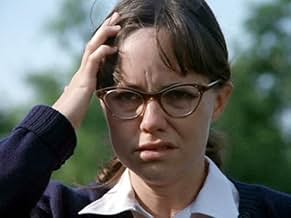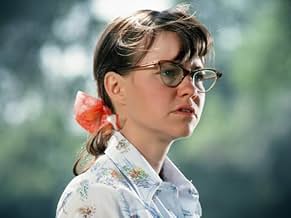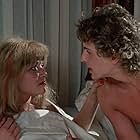Una joven que experimentó una infancia tan angustiosa que desarrolló dieciséis personalidades distintas.Una joven que experimentó una infancia tan angustiosa que desarrolló dieciséis personalidades distintas.Una joven que experimentó una infancia tan angustiosa que desarrolló dieciséis personalidades distintas.
- Ganó 4 premios Primetime Emmy
- 6 premios ganados y 5 nominaciones en total
Opiniones destacadas
There's a small performance in this movie that haunted me more than almost anything else in the film; the part of the grandmother, played by Jessamine Milner, who was as much a victim and prisoner in the home of her psychotic daughter as Sybil was. The difference was she was aware of the extent of her daughter's insanity.
What must it be like to be a prisoner in your own adult child's home, knowing she is inflicting abuse on your grandchild and will do the same to you if you speak? That kind of helplessness must be sheer hell to live with. She could have told her son-in-law or the police at any time (if she was able to get out of the house), but would they have done anything? Or turned a blind eye, considering the time?
Jessamine Milner's performance was so honest and affecting, it stands out as one of the most painful parts of the film, and she is in only two minutes of it! She was born in 1894, and was almost 80 when she made the film. She apparently was in her mid-seventies when she went into film! She's a mystery, and other than her few TV appearances in the late 70s, nothing apparently is known about her. However, she deserves a mention somewhere because of her performance in this difficult to watch film.
The movie Sybil is about the life and lives of at least 16 different people all sharing the body of one person. The movie deals with a hard subject and has some pretty disturbing scenes. One scene that is very unsettling happens towards the end of the movie where Sybil's crazy mom locks her in a trunk. The things that he r mother put her through are so horrible. It's a shame that this young woman's life was full of obstacles. Sally Field definitely deserved an Emmy for her compelling, complex performance as the title character. She goes from each personality flawlessly. She is a very talented actress, the performance only proves that she can play any part. Joanne Woodward, who in this film has switched roles from her Oscar winning performance in The Three Faces Of Eve, where she played a woman with MPD, does an equally outstanding job. Brad Davis turns in one of his best performances. The movie itself is one of the best made for television movies. It grabs you and holds you until it's chilling ending. Sybil is a movie surrounded hope, but covered in sadness. It is an excellent piece of movie making. I give it 4/4.
Vivid, unsettling true story given enormous stature by Joanne Woodward and Emmy-winning Sally Field.
Sally Field is unforgettable as the titular victim of incessant child abuse, a woman who dissolved into SIXTEEN separate and distinct personalities in order to cope with a mother who inflicted indescribable childhood tortures. She is nothing short of amazing, especially in her "dissociative" scenes as she morphs with lightning speed into one or more of her "inner family" -- a combative, self-assertive Peggy Lou, a mothering but suicidal Mary, a vivacious, ambitious Vicky, a frightened, thumb-sucking Sybil Ann, or even an athletically-inclined Mike. All of them personalities created and programmed unconsciously by Sybil to endure any situation she herself couldn't handle, and triggered by almost anything -- a hostile argument, piano music, certain colors, street sounds, even a word.
What is incredible about Field's performance as Sybil (not her real name) is the ability to tear down her own barriers to such an extent that she can revert into a flood of strange babblings or shockingly infantile behavior at the drop of a hat. It is such a compelling and all-consuming feat that these scenes come off almost improvisatory in style. One particular marvel of a scene has Sybil's psychologist discovering her patient, an artist by nature, lodged under a piano taken over by one of her more immature personalities, tormented by thunderous sounds of Dvorak and Beethoven, illustrating her torment on paper with brightly-colored crayons. It is to director Daniel Petrie's credit that he was able to create such a safe environment for Field to let herself go like this. With "Sybil," Field, who won an Emmy, forever dispelled any theories that she was a one-note actress trapped with a Gidget-like cuteness.
In an ironic bit of casting, Joanne Woodward essays the role of Sybil's psychologist, Dr. Cornelia Wilbur, who finally pinpoints Sybil's mental disability and starts her on the long, arduous journey of putting the "selves" back together. Woodward won an Academy Award decades earlier as a similar victim of MPD (multiple personality disorder) in a curious but ultimately heavy-handed and very dated film "The Three Faces of Eve." Woodward is superb here as a professional clearly out of her element but determined to find a light at the end of the tunnel for this poor, unfortunate girl.
The late Brad Davis, as an unsuspecting acquaintance who wants to get to know Sybil better, adds a tender, sympathetic chapter to Sybil's turbulent life, while William Prince and Jane Hoffman are compelling as Sybil's bloodless father and stepmother who offer puzzling, ignorant explanations to Sybil's "problem." Charles Lane has a significant scene as Sybil's small-town doctor (as a child) who failed to report his examination findings, and little Natasha Ryan, in flashback sequences, must be commended for reenacting the more harrowing details of Sybil's childhood torment. Jessamine Milner as Sybil's grandmother has a few affecting moments as a doting grandma who offers Sybil brief moments of respite.
However, the most chilling portrait of evil you'll ever witness on TV goes hands down to stocky, harsh-looking Martine Bartlett as Sybil's monster of a mother. She lends horrifying believability to the fragmented, unbalanced woman who gets sadistic pleasure out of her routine torturous acts. Bartlett, a respected stage actress little seen on film, was known for another bizarre but fascinating screen role as a crazy, self-abusing mental patient in "I Never Promised You a Rose Garden." As Hattie Dorsett, she displays subtle, calculating menace, which makes her even more terrifying, as she devises a number of "games" to inflict on her only child. Some of these scenes are extremely repelling and graphic in nature, but it is all handled as responsibly as possible, considering the actual incidents DID occur.
Hopefully seeing this dark, disturbing, but ultimately important TV-movie will inspire you to read Flora Rheta Schreiber's best selling book, which details Sybil's childhood, blackout episodes (the real Sybil once woke up finding out she had missed the entire sixth grade(!), therapy sessions, the battle of alter-egos for control of Sybil, and the subsequent unifying process, through the professional vantage point of Dr. Wilbur and with more depth. Trust me, you won't be able to put it down and you'll never question the boundaries and/or consequences of child abuse again.
WARNING - Don't rent the confusing, chopped-up two-hour version, also available on tape. This was a two-part, over three-hour long drama when initially shown and THIS version is what rates a "10."
Argumento
¿Sabías que…?
- TriviaThe real "Sybil" was identified in 1998 as Shirley Mason, an art teacher who died in 1998 at the age of 75 in Lexington, Kentucky. Flora Rheta Schreiber, who wrote the book on which "Sybil" was based, gave her the name based on the women prophets of Greek mythology, the Sibyls, who spoke with multiple voices.
- ErroresIn present day scenes (set in mid Seventies), Sybil appears to be in anywhere from 25-to-30 years old. But in flashbacks to her childhood scenes when she's around 5 years old (which would be either late 1940's or early-mid 50's), everything (cars, fashions, hair, etc.) appears to be set in 1930's - long before she was even born.
- Citas
Dr. Cornelia Wilbur: [Hugging Sybil] Once a long time ago when I was a little girl in Montana, I was laying in the grass looking at the ants. And the sun was warm on my back and the grass was deep and soft and the insects were buzzing... everything was drowsy. Then all of a sudden, I saw this one ant who was struggling to pick up this grain of sand that was far too heavy to carry alone. And he struggled. And pretty soon, ANOTHER ant came along and helped the first ant and together they carried it away! Well, I got so excited that I hollared to my mother and she came out and plopped down in the grass beside me and she said, now isn't that miraculous how much two creatures can accomplish together... when they care about each other.
- Versiones alternativasThe original TV-version ran two nights for a total of four hours (198 minutes minus the commercials). Most video copies are pared down in length, one running 122 minutes and another "expanded" to 132 minutes. Both these versions are missing key scenes such as:
- The introduction of of the alternate personality "Vanessa"
- Sybil's first date with Richard
- Her recollection of her childhood sweetheart.
- Sybil dissociating into the personality of an infant, leading to Dr. Wilbur's memorable statements "My god Sybil, what did that monster do to you? What happened in the green kitchen?"
- Dr. Wilbur confronting Willard Dorsett over him having left his daughter in the care of such an obvious and dangerously disturbed woman as Hattie
- Sybil's two male personalities arguing with Dr. Wilbur about them being able to father children
- Sybil finally confronting and learning to accept all of her personalities while under hypnosis
- ConexionesFeatured in The 29th Annual Primetime Emmy Awards (1977)
Selecciones populares
Detalles
- Fecha de lanzamiento
- País de origen
- Idioma
- También se conoce como
- Sybil - en verklig mardröm
- Locaciones de filmación
- Productora
- Ver más créditos de la compañía en IMDbPro
Contribuir a esta página






























